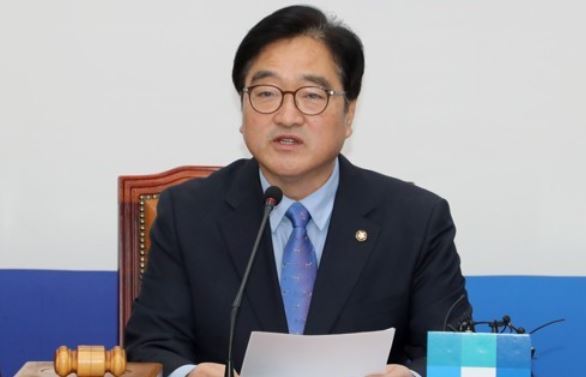Ruling party steps up efforts for new anti-corruption agency
By YonhapPublished : Nov. 22, 2017 - 11:57
The ruling Democratic Party on Wednesday ratcheted up its push to institute an agency in charge of probing corruption involving senior officials and their families, amid objections from the main opposition party.
The independent investigation agency is one of President Moon Jae-in's key campaign pledges to diffuse investigative power concentrated in the prosecution and to curb irregularities among high-level officials from the government, parliament and judiciary.
But top brass at the Liberty Korea Party have opposed the agency, voicing worries that it could be exploited as another "political entity" that would serve the interests of those in power and that it could become another organ prone to abuses of power.

Unbowed by the opposition, the ruling party sought to drum up public support for the efforts to enact the agency.
"The agency is a broad trend of our times that can't be reversed," Woo Won-shik, the floor leader of the Democratic Party, said during a meeting with senior party officials. "A majority of citizens are making grave calls for (the agency) to root out corruption involving those in power."
Woo, in particular, cast the establishment of the agency as an "order of the candlelight," referring to nearly six months of massive protests that led to the ousting of corruption-tainted former President Park Geun-hye in March and propelled Moon to presidency in May.
He asked, "What is the Liberty Korea Party fearful about?"
On Monday, the ruling party and the government held a policy consultation meeting where they stressed their commitment to establishing the agency. The two sides hope to pass a set of related bills during the regular parliamentary session this year.
"I will not relax our efforts to establish the agency," Cho Kuk, the senior presidential secretary for civil affairs, said during the meeting.
The talks came a day before a parliamentary subcommittee convened to deliberate on the bills for the agency. But the session made little progress when the LKP members dug in their heels.
To move the bills beyond subcommittee-level deliberation, all eight subcommittee members must endorse them. This means three LKP lawmakers must agree to table the bills for full committee-level discussions.
Under a proposal by the justice ministry, a special recommendation panel would select two candidates for the agency's chief, one of whom would be selected by the parliament and then appointed by the president. If the parliament fails to pick a candidate, its speaker could recommend two candidates, with one then appointed by the president.
The People's Party, which is seen as carrying a "casting vote" in important legislative affairs, largely agrees to the establishment of the agency, on condition that the agency's chief is from the opposition bloc.
The LKP, however, insists that rather than establishing a new investigative authority, it would be better to revamp the existing investigation bodies first. (Yonhap)







![[KH Explains] No more 'Michael' at Kakao Games](http://res.heraldm.com/phpwas/restmb_idxmake.php?idx=644&simg=/content/image/2024/04/28/20240428050183_0.jpg&u=20240428180321)

![[Weekender] How DDP emerged as an icon of Seoul](http://res.heraldm.com/phpwas/restmb_idxmake.php?idx=644&simg=/content/image/2024/04/25/20240425050915_0.jpg&u=)








![[Herald Interview] Mistakes turn into blessings in street performance, director says](http://res.heraldm.com/phpwas/restmb_idxmake.php?idx=652&simg=/content/image/2024/04/28/20240428050150_0.jpg&u=20240428174656)
